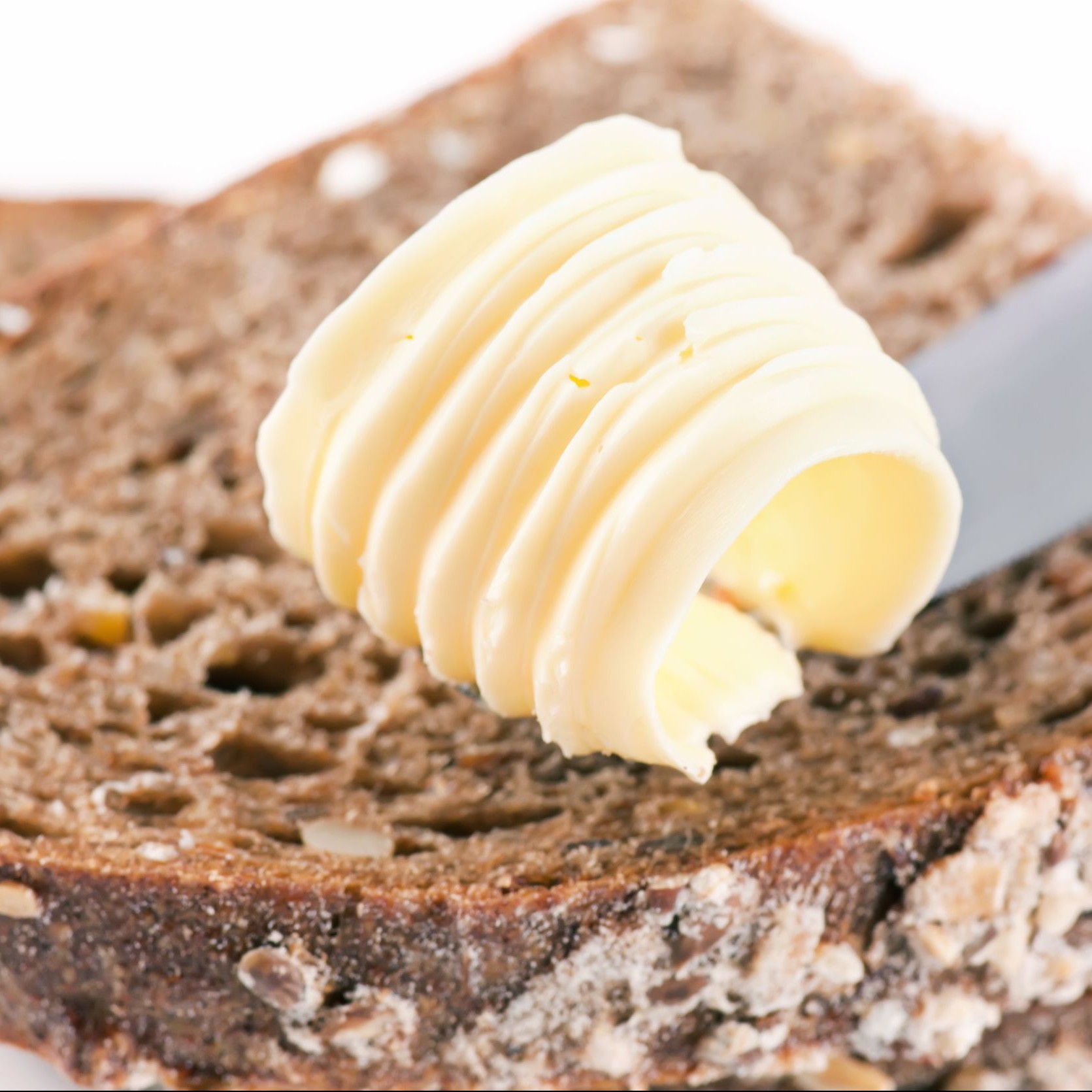
The news recently announced research that proclaimed, Butter is back! For those of us who work and live in the world of baked goods, laminated doughs, and bread this is fantastic news. The researchers conducted a systematic review of 9 data bases from inception to 2015.3 The study aimed to systematically review and Meta-analyze the association of butter consumption with all-cause mortality, cardiovascular disease, and diabetes in general population.3
I didn’t realize butter had ever left though it is hard to ignore the trends of “healthier” plant based saturated fats such as coconut oil. Since the 1980s the American Heart Association has recommended limiting the intake of saturated fats. Butter was villainized claiming the highest level of SFA in the dairy category.
Does the research mean we can slather pounds of butter on our morning slice of whole grain bread?
Before you slice that butter knife into a stick of butter, let’s take a look at the relationship of saturated fatty acids (SFA) and the risk of coronary heart disease (CHD). Saturated fats are commonly found in butter, cheese, beef, pork, poultry with skin and some plant based oils such as coconut and palm. Saturated fats have no double bonds between carbon molecules because they are saturated with hydrogen molecules. Saturated fats are typically solid at room temperature.2 The major SFAs positively associated with a higher risk of Coronary heart disease are Lauric acid (12:1), myristic acid (14:0), palmitic acid (16:0), and stearic acid (18:0).1
In two large prospective cohorts of US men and women, dietary intakes of major individual SFAs—including lauric acid (12:0), myristic acid (14:0), palmitic acid (16:0), and stearic acid (18:0)—were positively associated with risk of coronary heart disease during 24-28 years of follow-up.1 Replacement of 1% daily energy intake from the combined group of 12:0-18:0 by equivalent energy from polyunsaturated fat, whole grain carbohydrates, or plant proteins was associated with a 6-8% reduced risk of coronary heart disease.1 The same replacement of 16:0 was associated with 10-12% reduction in risk.1
What this means
The study supports current dietary guidelines that focus on reducing total saturated fat intake with unsaturated fats, which for example, can be achieved by replacing animal fats (eg, butter, lard) with vegetable oils high in unsaturated fat (eg, olive oil, canola oil).1 What happens when we look at butter on its own instead of lumping all saturated fats into one study? Butter consumption and incident CVD (total CVD, CHD or stroke) was investigated in 5 studies from 4 cohorts, including 175,612 participants and 9,783 cases of any CVD.3 The conclusion? Butter intake was not significantly associated with CVD.3
Even though the studies linking the consumption of butter and cardiovascular disease and coronary heart disease are somewhat contradictory all the researchers agree the key is a balanced diet. Consuming whole foods such as fruits, grains, vegetables and lean meats and moderation of processed foods, SFAs, carbohydrates and sugars is still the best recommendation for heart health. So, go ahead and offer complementary butter, coconut spread, or even olive oil with that whole grain bread your bakery produces.
References
- Zong Geng, Li Yanping, Wanders Anne J, Alssema Marjan, Zock Peter L, Willett Walter C et al. (2016). Intake of Individual Saturated Fatty Acids and Risk of Coronary Heart Disease in US Men and Women: Two Prospective Longitudinal Cohort Studies. BMJ, 2016;355 :i5796 doi: http://dx.doi.org/10.1136/bmj.i5796
- “Saturated Fats.” American Heart Association. 12 Oct. 2016. www.heart.org/HEARTORG/HealthyLiving/HealthyEating/Nutrition/Saturated-Fats_UCM_301110_Article.jsp#.WLWO5_krLIU Accessed 28 Feb. 2017.
- Pimpin, Laura, Jason H. Y. Wu, Hila Haskelberg, Liana Del Gobbo, and Dariush Mozaffarian. “Is Butter Back? A Systematic Review and Meta-Analysis of Butter Consumption and Risk of Cardiovascular Disease, Diabetes, and Total Mortality.” PLoS ONE 11.6 (2016).

